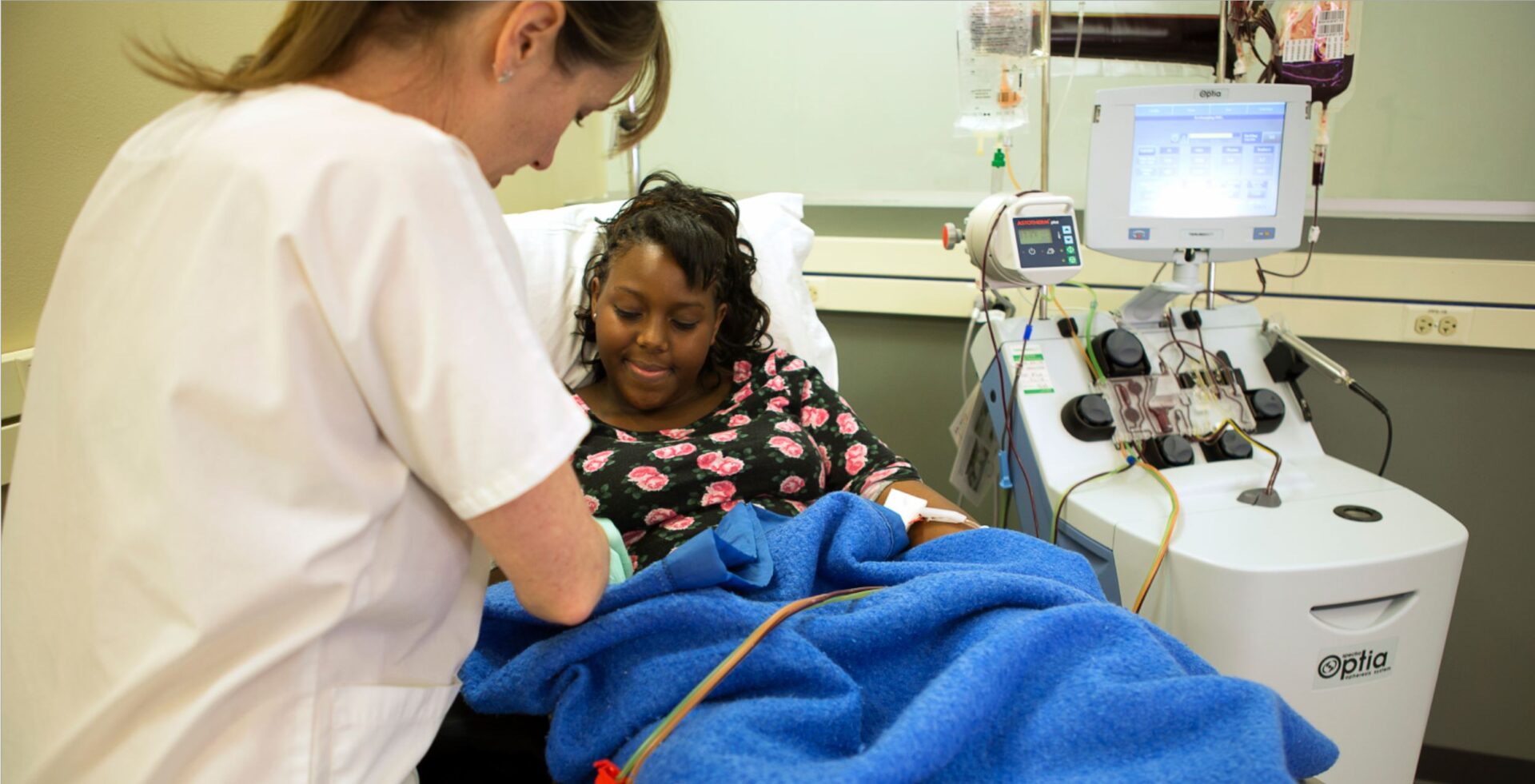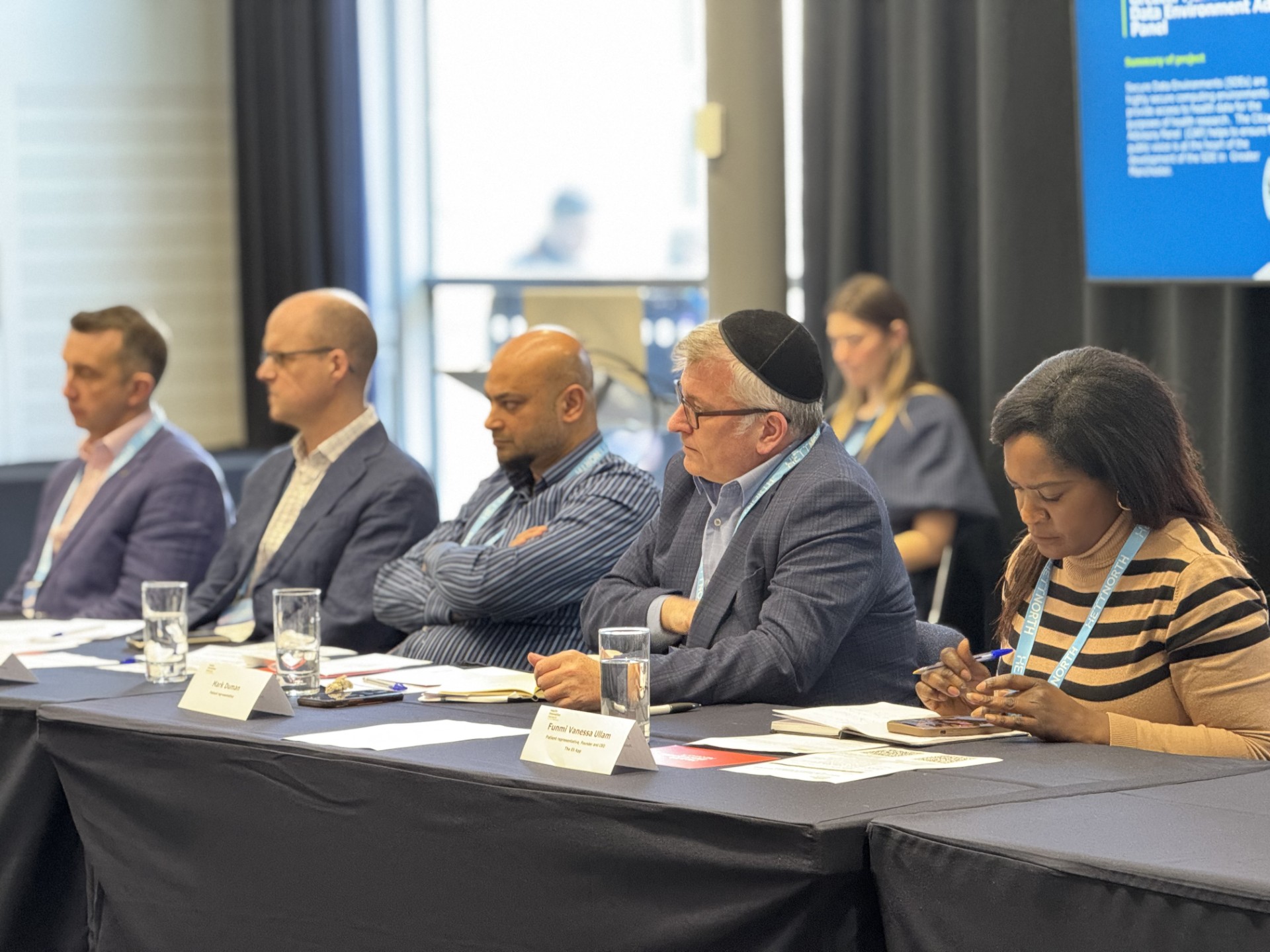Hundreds of children, young people, and adults across England suffering from sickle cell disease will soon benefit from better care closer to where they live, following the announcement of a £1.5M investment in 25 red blood cell exchange devices.
Funding for the Spectra Optia® Apheresis System devices has been distributed to 22 NHS trusts*, with the devices set to be installed in hospitals for the treatment of patients by the end of March.
There are approximately 15,000 people in the England with sickle cell disease, and around 10% of these are eligible for the treatment on the NHS. Investment in the roll out of this technology could provide an additional 10,000 apheresis procedures annually.
Sickle cell patients often find themselves in and out of hospitals, enduring severe pain and requiring regular ‘top-up’ blood transfusions.
Automating red blood cell exchanges can help reduce the necessity for top-up transfusions, effectively manage pain, and lower the risk of experiencing a crisis. Eligible patients can receive treatment every six to eight weeks.
Sickle cell disease disproportionately impacts people from West African and Afro-Caribbean communities, and patients also often live in the most socio-economically deprived areas and are at higher risk of both re-admissions and in-hospital mortality.
The funding will provide at least one machine to each of the trusts that expressed an interest in expanding their automated red cell exchange services. This will mean patients in urban, rural and coastal areas will have improved access to services, which in turn will help tackle the inequalities in healthcare access and health outcomes amongst people with sickle cell disease.
This investment comes from NHS England Specialised Commissioning.
The Spectra Optia device is one of the technologies supported through NHS England’s MedTech Funding Mandate. The Health Innovation Network (formerly known as the AHSN Network) is the lead delivery partner for the Mandate, which is designed to accelerate the adoption of selected cost-saving medical technologies, diagnostics, and digital products recommended by the National Institute for Health and Care Excellence (NICE).
Improving access to red blood cell exchange therapy can save the NHS in England up to £12.9M annually while reducing health inequalities, according to NICE guidelines.
Harriet Smith, National Programme Lead for Spectra Optia, at Health Innovation Yorkshire & Humber, said: “This funding will play a pivotal role in ensuring sickle cell patients receive more regular care closer to where they live, as well as help reduce health inequalities. I’m very proud of the role the MedTech Funding Mandate has played in the roll-out of this technology to ensure we meet the automated red blood cell exchange needs of sickle cell patients.”
John Stewart, National Director for Specialised Commissioning, NHS England, added: “NHS England is committed to improving the support provided to people with sickle cell disease. This investment to increase the number of devices for automated red blood cell exchange across the country will support the expansion of services and improve access for patients who need regular transfusions.”
Verena Stocker, Director of Research, Innovation, Life Sciences and Strategy, NHS England: “This innovation is a great example of how working collaboratively across organisations helps accelerate the uptake of life-changing innovations. We are committed to bringing the best health technologies to patients more quickly, supporting the spread and adoption of medical devices, diagnostics, and digital products that are clinically effective.”
Antoinette Gawin, President and CEO, Terumo Blood and Cell Technologies: “This investment helps more patients get treatment with a proven therapy to manage sickle cell disease. This option has existed for years but has been inaccessible to some patients — especially in underserved communities — due to barriers, including limited awareness. Now, thanks to the collaborative efforts of the NHS, the Health Innovation Network and the voice of patients, this sickle cell therapy with Spectra Optia will be an option for more people who may benefit.”
Find out more about the MedTech Funding Mandate.
If you would like more information about Spectra Optia, please contact National Programme Lead harriet.smith@yhahsn.com
*Table showing which Trusts will receive funding for the Spectra Optia devices, and the allocation of devices.
| Trust | Allocation |
| University Hospitals of Leicester NHS Trust | 1 |
| Nottingham University Hospitals NHS Trust | 1 |
| Birmingham Women’s and Children’s NHS Foundation Trust | 1 |
| Barking, Havering and Redbridge University Hospitals NHS Trust | 1 |
| Barts Health NHS Trust | 1 |
| University College London Hospitals (UCLH) | 1 |
| Kings College Hospital NHS FT | 2 |
| Croydon Health Services NHS Trust | 1 |
| Lewisham and Greenwich NHS Trust | 1 |
| Guys & St. Thomas NHS Foundation Trust | 1 |
| Homerton University Hospital NHS Foundation Trust | 1 |
| Imperial College Healthcare NHS Trust | 2 |
| St George’s Healthcare NHS FT | 1 |
| Mid and South Essex University Hospitals Trust | 1 |
| Bedfordshire Hospitals NHS Foundation Trust | 1 |
| East Suffolk and North Essex NHS FT | 1 |
| Milton Keynes University Hospital NHS Foundation Trust | 1 |
| University Hospitals Plymouth NHS Trust | 1 |
| Manchester University NHS FT | 1 |
| South Tees Hospitals NHS Foundation Trust | 1 |
| The Newcastle Upon Tyne Hospitals NHS FT | 2 |
| University Hospital Southampton NHS Foundation Trust | 1 |
[1] Figure from the NICE guidelines: https://www.nice.org.uk/guidance/mtg28/chapter/1-Recommendations

The need for fast-paced innovation in healthcare is widely acknowledged. And ensuring that healthcare innovation is shaped by the people it serves remains a pressing priority – one made all the more evident by the growing emphasis on health equity in the 10 Year Health Plan. Patient voices are often cited as central to healthcare [...]

The NHS Innovation Accelerator (NIA) has revealed its 2025 cohort of Fellows. As the NIA celebrates a decade of helping to drive innovation in the NHS, this year’s cohort aligns with the Government’s three priorities: supporting the transition from analogue to digital, sickness to prevention and hospital to home. The 28 new Fellows will benefit [...]

A new guide aimed at helping primary care organisations and integrated care boards understand and address problematic polypharmacy has been launched by the Health Innovation Network as part of its national Polypharmacy Programme. Developed in response to a clear need identified by primary care and prescribing colleagues, this essential resource provides practical, evidence-based strategies to [...]









